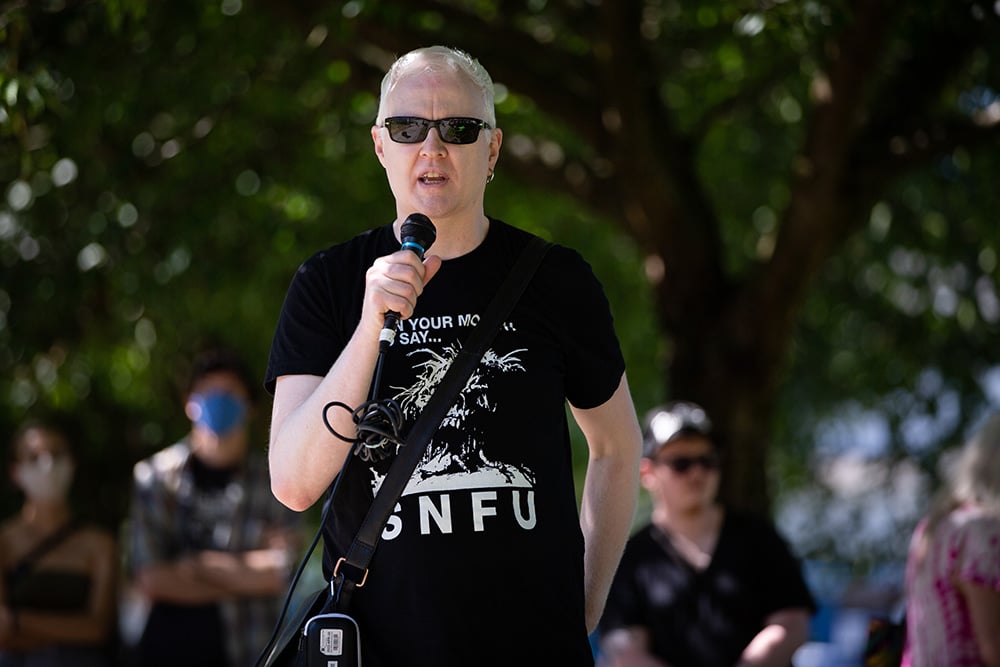Every month following the release of the coroners’ report on the number of people who have died from toxic illicit drugs in British Columbia, Garth Mullins finds himself doing the same things over and over alongside fellow drug users and activists.
“We think of ways to light the fire under the politician’s asses,” Mullins said. “We talk to reporters, we mourn our friends, we try to do something.”
The coroners’ report almost always includes the deaths of people Mullins knew through work with the Vancouver Area Network of Drug Users and life in the Downtown Eastside.
But on Wednesday, the day B.C. learned 155 more people had lost their lives to drugs poisoned with increasingly contaminating concentrations of fentanyl and benzodiazepines in February, Mullins was at a loss.
“I’m all out of kindling and gasoline,” said Mullins, who told The Tyee he was lying on the floor during the interview. “I just don’t know what to do. I feel really defeated.”
February’s figures reveal a large jump from the same time last year, when 75 people lost their lives to toxic illicit drugs.
It is the 11th month in a row where more than 100 people died of toxic drug poisonings in the province. In addition to increasing contamination in the illicit drug supply, pandemic measures have limited capacity at harm reduction sites for supervised consumption and drug-checking.
During the pandemic, about 13 per cent of deaths have resulted from extreme fentanyl concentrations, compared to eight per cent before the pandemic.
As the Globe and Mail reported last week, the increased presence of benzodiazepines in drugs is also leading to greater risk of respiratory depression and overdoses that cannot be reversed by traditional and readily available oxygen or naloxone.
“What people need the most is also a safe supply of benzos,” said Laura Shaver, the treasurer of VANDU. “There’s nowhere for people to get it, and there’s nowhere to go to detox off it.”
In September, the province announced it would expand the substances and pharmaceutical alternatives available to people who use drugs in order to help them avoid illicit street supply.
Nearly seven months later, there is no further detail on the status of the effort or when it will come into effect. Current opioid substitute options like oral hydromorphone — “distant cousins” of what people need and want, said Mullins — aren’t accessible enough, even when someone finds a doctor willing to prescribe them.
“Despite the enormous challenges ahead, our government is committed to supporting and separating people from the poisoned drug supply,” said Sheila Malcolmson, B.C.’s minister of mental health and addictions, in a news release.
Last month, the province said its safe supply effort is in the hands of medical professionals with the colleges representing physicians and pharmacists.
Adam Olsen, Green MLA for Saanich North and the Islands, recently grilled Malcolmson in the legislature about safe supply and decriminalization. In an interview with The Tyee, Olsen said this past year didn’t have to be this way.
“If we saw this government act with urgent pace early on, we could be in a different situation right now,” he said.
Olsen said that while many policies do take time, the province could have acted more swiftly on decriminalization of illicit drugs when provincial health officer Dr. Bonnie Henry laid out a roadmap for the process in April 2019.
“The longer this is delayed, the greater the numbers of people who have perished in this awful public health emergency,” he said. “At some point, the accountability has to be taken.”
Based on the meetings Mullins has attended, his view is that little progress is being made.
“Doctors are saying no. Some of those influential doctors in B.C. are saying no,” said Mullins, noting that physician hesitancy can make finding someone to give access to a prescription alternative nearly impossible.
“The process is stalled,” he said.
Mullins would like to see the province make way for non-medical, community-based safe supply efforts to circumvent the gatekeeping role doctors and other prescribers currently hold.
It’s something government hasn’t seemed interested in, Mullins said, despite mounting deaths that signal the status quo is untenable.
As for what could trigger change and urgency, Mullins says it’s clear the current approach isn’t enough.
“I think drug users and activists need to cause some irritation, to raise the cost of the status quo,” he said.
“Months just keep going by, and 150 people or more keep dying.” ![]()
Read more: Health, BC Politics
















Tyee Commenting Guidelines
Comments that violate guidelines risk being deleted, and violations may result in a temporary or permanent user ban. Maintain the spirit of good conversation to stay in the discussion.
*Please note The Tyee is not a forum for spreading misinformation about COVID-19, denying its existence or minimizing its risk to public health.
Do:
Do not: